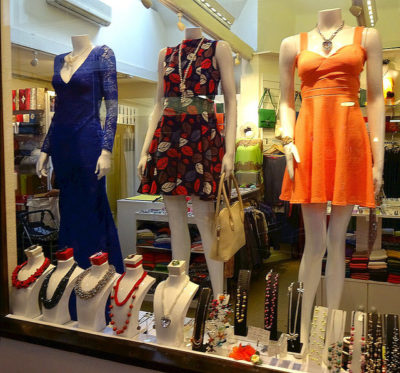by Vani Viswanathan
They call out to you no matter where you go. Colourful, tempting, with the right colours – not unlike the red notification button that Facebook knows you will want to click.
Ads, billboards, videos – they all want you to shop.
You’re innocently reading news online, but there, in the corner, is an ad from the site that you clicked on a few days ago and added to cart a bag/dress/earrings but reason won and you resolutely left the site. You walk unfalteringly to the multiplex in the mall – ignoring the brands and the inviting sales – but on the way out, you do amble about, looking at what’s on display, and wonder if it’s ok to just see what’s new. You scroll through Facebook, and a gorgeous-but-outrageously-expensive brand of furniture or crockery sneaks in in between mundane videos friends have shared. A relative sends images of accessories, fabric or sarees on WhatsApp – some do look tempting. Billboards make it known that you’re senseless if you miss the totally-worth-it sale where everything’s at 70 percent off. An online clothes store texts you to say they’ve added “free credit” of a few hundred rupees that you can use in the next two days. You have nowhere to hide.
I pride myself on my ability to resist temptation, but this is to put to utmost test these days: you are assaulted by urges to shop, and they catch you on every platform conceivable.
Of course, I’m not placing all the blame on these nebulous them, they who are out to trick you into thinking you need things you don’t need and into buying them by convincing you of their intrinsic value, or tell you that you are a doofus for continuing to wear things that are so last season. Where does our sense disappear?
Given this rant, here’s something I’d like to share: I dislike shopping. I like window shopping, but that’s where it stops – my willpower is rather strong, and very rarely do I buy something I don’t truly want (note that I didn’t say “need” here to falsely sound saintly). I am prone to rationalising my wants for several weeks or months (sometimes years) until I am convinced that I want to spend on this particular item. If I catch myself thinking about it after a long time, off I go to buy it. What helps me in this is that I severely lack patience in looking through hundreds of things to find the one perfect thing I want. I remember once deciding to pick up a dress for an office Christmas party, roaming the length of Orchard Road in Singapore, and miserably coming back to the first shop I visited, to pick up the first dress that had caught my eye. To this day, I remember the wretchedness with which I went about this task. I bought all the sarees for my wedding in two hours, from a single store. Thankfully, this pattern extends to online shopping too, so I drop the idea of looking for something I “might want” after browsing through two pages.
All this context is to convey that I also, however, succumb to the urges that shopping initiates in the urban consumer of today. I do like dressing up, and wish I had as extensive a wardrobe as some of my friends (I’m sure my partner would be aghast if he read this, as he believes I have a lot of clothes even as I try to convince him that “it’s all relative”). This longing, coupled with my rationalising, often puts me at an odd place, a suspended point above earth but not (retail) heaven.
However, over the last few years – and more so, the last few months – I have been relooking at shopping from the perspective of the impact it has on the environment, and the impact it has on my mind. There are enough stories about how fast fashion damages the environment because of its quick cycles, pushing people to buy the latest, with no regard for what was bought a few months ago. I also dislike clutter and am prone to periodic fits of organising my things. Spurred on in no small part by the lack of space in my house, I have thought a lot about reducing the number of things I own. I hardly buy physical copies of books, and I think dozens of times before I buy something for the house. I periodically look through my wardrobe for things that have to be let go, a very important task given I have a tendency to keep things (even if intact) for years.
Besides these actions, I started exploring the idea of minimalism. Quite the buzzword these days – one can even buy “minimalist furniture”! – minimalism has been flexible enough to allow for wide interpretations. Of these, I liked the idea of owning just enough to cover your needs and some wants, and of reducing clutter, both physically and emotionally. Since I’m not really into shopping, this extra step should be easier, isn’t it?
Emotional clutter probably warrants a whole other discussion, but as I began to plan my 2018, I thought about taking a few steps to check my wants and resist the temptation to buy things because the messaging just hits at you wherever you look. My biggest temptations are clothes, books and bags, and these are the areas I needed to control.
For starters, I decided to only buy clothes during three occasions a year, once in the first half and twice in the second half. I will only purchase shoes if I give away a pair I already have – and put comfort and durability over fashion, no matter the cost. Books will be purchased online only, unless they are not available digitally. I will borrow clothes or accessories that I might need only for one occasion. I will not succumb to the temptation of having bags for every occasion.
It’s probably just me (or is it?) but it’s difficult to put these into practice, especially in a place like Delhi, where many people in my circles are impeccably dressed, with clothes, bags, jewellery and shoes that match the occasion, and which don’t repeat for a long time. It’s often not even a question of money, for in Delhi, one can find really fashionable stuff for reasonable prices, thanks to the likes of Sarojini Nagar and Janpath markets. Delhi adds a layer of complication thanks to its weather, requiring different clothes every few months – which means my limited closet space is burgeoning with clothes for all kinds of weather. It takes a lot of self-control – or, I guess, a state of zen – to dissociate from these plebeian pleasures of dressing up and looking good. I constantly have to remind myself that no one really cares if I carry a non-wedding-y bag to a wedding. Or that no one gives a damn if I wear flats with sarees. And it doesn’t matter if all my vacation pictures have similar clothes (I do wish they didn’t, but the focus should be on the travel).
I haven’t managed to do all of this yet, but I’m on my way there. A few simple tips from minimalists are helping: donate/recycle anything that you haven’t used in the last six months; try dressing in only 33 items of clothing/accessories for 3 months (which I will try once summer is in full swing) to see how less you actually need; the 20-20 rule of if it costs less than 20 dollars (ok, maybe 200 rupees?), and is available within 20 minutes of home, maybe you don’t have to hold on to it for months without using it, thinking, “but I might need this at some point!”
It’s an exciting journey, for sure. It’s exciting to know that I can find other paths to happiness than relying on shopping all the time. I like to travel, and I derive much more pleasure from that than in shopping or owning things. I understand that such substitutes are not possible for everyone – and that people are made differently – but I like imagining a life where maybe shopping occupies only a small portion of my thought and effort. That way, I can perhaps make it a more enjoyable than a miserable experience!






